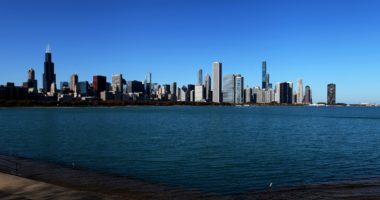Illinois Legislature Takes Another Swing At Amending Tax Code For Future Chicago Casino


Amendment 5 has some other interesting language in it as well. That pertains to the term for reconciliation fees and video lottery terminals at the annual Illinois State Fair.
How the amendment would affect the game duty in Chicago
The future providers of a casino in Chicago are already subject to an additional opportunity duty of 33.3 % under the law. In addition to the same graduated tax rates that current Illinois casinos pay in other regions of the state, that & rsquo.
A new graduated income schedule for a Chicago blackjack may be established by the amendment’s language. These innovative rates and levels for total annual profits for slots would be:
- Up to and including$ 25 million, or 12 % to the state and 10.5 % to Chicago.
- 16 % to IL and 14 % to Chicago:$ 25, 000, 001 to$ 50,000,000.
- 20.1 % to IL and 17.4 % to Chicago are found in the range of$ 50, 000, 001 to$ 75, 2000, and 000.
- 21.4 % to Illinois and 18.6 % to Chicago:$ 75, 000, 001 to$ 100,000
- 22.7 % to Illinois and 19.8 % to Chicago in the range of$ 100, 000, 001 to$ 150,000
- 24.1 % to Illinois and 20.9 % to Chicago:$ 150,000, 001 to$ 225, 000.
- 26.8 % to IL and 23.2 % to Chicago:$ 225, 000, 001 to$ 1 billion
- Over$ 1 billion: 34.7 % to Chicago and 40 % to Illinois
fresh game deadline for tables
A new deadline for table games is also suggested in the amendment, but it is limited to the possible future Chicago casino. Similar to the slots, it & rsquo imposes a graduated privilege tax on total annual revenue.
- Up to and including$ 25 million, with 6.9 % going to the City of Chicago and 8.1 % being the state.
- 9.6 % to IL and 8.4 % to Chicago are found in the range of$ 25, 000, 001 to$ 75, 2000, and 000.
- 12.3 % to Al and 10.7 % to Chicago:$ 75, 000, 001 to$ 1875,000
- 13.5 % go to Illinois and 11.5 % to Chicago for the range of$ 175, 000, 001 to$ 225,000.
- 15.1 % to Illinois and 12.9 % to Chicago are found in the range of$ 225, 000, 001 to$ 275,000.
- 16.2 % to IL and 13.8 % to Chicago:$ 275, 000, 001 to$ 325,000
- 18.9 % to Illinois and 16.1 % to Chicago, over$ 325,000
This doesn’t really reflect a significant change in the powerful rates. However, it would significantly increase the graduated tiers’ current thresholds, lowering the casino & rsquo operator’s annual tax obligations.
For instance, the law currently imposes a top rate of 74.7 % on slot machine revenue exceeding$ 200 million. According to the new plan, the game wouldn’t pay that price until it generated$ 1 billion in revenue from that source.
The amendment just needs Gov. Pritzker’s signature after both chambers of the Illinois Legislature approved the measure Friday. It’s a necessary alteration if the Chicago casino project is to move forward.
Why does the article deal with the casino duty in Chicago?
The initial duty routine presented serious issues. That became painfully clear when a third party with in-depth awareness of casino gambling examined the circumstance.
Union Gaming Analytics conducted a feasibility study in August. research for legislative purposes. Among other things, the statement examined potential locations for a game in Windy City.
Among the findings was that it would be almost impossible for a casino operator to turn any profit with the current tax schedule. The study found that the casino would pay 72% of its take to the city and state.
Any business owner will agree that it can be challenging to cover all operating costs, let alone attempt to turn a 28 % profit. But, the issue affected more people than just those looking to establish a game close to Lake Michigan.
This was dangerous because the state considered opening a game in Chicago in the future to pay for retirement and other financial requirements. Because of this, a number of events have been working on the problem for decades.
The next day could be the charm.
Last November, Illinois Rep. Bob Rita proposed Amendment 3. That amendment would also have left the tax rates mostly intact but raised the thresholds for each graduated tier.
The top rate of 74.7 % would have only applied to slot machine revenue at and above$ 1 billion, just like in Amendment 5. Additionally, it established the board game schedule at the same amounts as Amendment 5.
The Illinois House’s entire surface was never used to vote on Amendment 3. Lori Lightfoot, the mayor of Chicago, decided to try it as a result.
Lightfoot supported an amendment that actually reached the Illinois House floor last December. She not only helped draft the language but testified in support of it to members of the Illinois House. The crux of that amendment was giving property tax breaks to developers.
But, the House voted the article down. Lightfoot at the time attributed the failure to lawmakers who were attempting to seize the opportunity and adding their own financing measures to help their districts.
That made Rita & rsquo’s second attempt this week, which has so far had much greater success, possible. If Pritzker signs the article into law, it might start the process of opening a casino in Chicago.
That isn’t the only change the amendment would make, though. For casino operators around the state and parties interested in video lottery terminals at the state fairgrounds, there is some important language in the amendment as well.
What else does Amendment 5 contain?
The Illinois Department of Agriculture is now permitted to run up to 50 game drawing stations on Springfield’s fair during the Illinois State Fair. The article provides some freedom for potential operators of new gambling in Chicago and other locations.
New games were permitted by the original laws in Chicago and four other counties in the state: Cook County, Danville, Rockford, and Williamson County.
The law requires those new licensees to spend what is referred to as a balancing charge. The cost makes up the difference between the license’s value at the time it was issued by the state and its value after the operator entered the new market.
The most lucrative 12-month period over the operator & rsquo, or the first three years of doing business, is designated by Illinois law as the time frame for determining the fee for each operator. That could be any 12-month stretch in a row. It’s not necessary for the word to run from January to December.
With the exception of a$ 15 million upfront fee for reconciliation, the operator must pay 75 % of that amount. According to the law as it stands today, the technician has two years to make that payment.
The deadline for paying the price is increased to six years by Amendment 5. This action, like raising the limits of the revenue plan for the Chicago casino, has a single objective in mind.
What are the goals of all these adjustments?
The reasoning behind this article can be understood in one of two ways. Both of them indicate a possible outcome that the Illinois Legislature may be hoping for.
A new game has not undergone much growth in any of the five locations, almost a month after passing its most recent gambling expansion law. Concerns about fees and taxes in addition to enhancement expenses combine to make the purchase a worthwhile one for casino operators.
The state making a sizeable investment in these potential game websites is one way to consider changing the schedule of these charges and taxes. Game developers will be able to recover their original expense in a shorter amount of time thanks to the higher tiers and longer repayment terms.
The success of these games is being bet on by the position itself. The condition is betting that it will make more money in the long run by taking a short-term loss as opposed to what the law actually demanded from casino operators.
This might lead to more betting operators in the future for Illinois sports bettors. The signature of Pritzker & rsquo is the secret to unlocking that potential.







